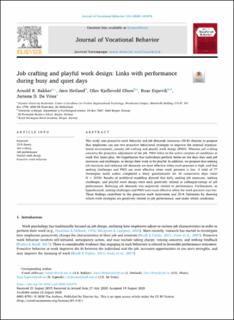| dc.contributor.author | Bakker, Arnold B. | |
| dc.contributor.author | Hetland, Jørn | |
| dc.contributor.author | Olsen, Olav Kjellevold | |
| dc.contributor.author | Espevik, Roar | |
| dc.contributor.author | De Vries, Juriena | |
| dc.date.accessioned | 2022-04-01T07:54:44Z | |
| dc.date.available | 2022-04-01T07:54:44Z | |
| dc.date.created | 2020-08-25T11:49:48Z | |
| dc.date.issued | 2020 | |
| dc.identifier.citation | Journal of Vocational Behavior. 2020, 122:103478 1-13. | en_US |
| dc.identifier.issn | 0001-8791 | |
| dc.identifier.uri | https://hdl.handle.net/11250/2989039 | |
| dc.description.abstract | This study uses proactive work behavior and job demands–resources (JD-R) theories to propose that employees can use two proactive behavioral strategies to improve the internal organizational environment, namely job crafting and playful work design (PWD). Whereas job crafting concerns the proactive adjustment of the job, PWD refers to the active creation of conditions at work that foster play. We hypothesize that individuals perform better on the days they seek job resources and challenges, or design their work to be playful. In addition, we propose that seeking job resources and reducing job demands are most effective when work pressure is high, and that seeking challenges and PWD are most effective when work pressure is low. A total of 77 Norwegian naval cadets completed a diary questionnaire for 30 consecutive days (total N = 2310). Results of multilevel modeling showed that daily seeking job resources, seeking challenges, and playful work design were each positively related to colleague-ratings of job performance. Reducing job demands was negatively related to performance. Furthermore, as hypothesized, seeking challenges and PWD were most effective when the work pressure was low. These findings contribute to the proactive work motivation and JD-R literatures by showing which work strategies are positively related to job performance, and under which conditions. | en_US |
| dc.language.iso | eng | en_US |
| dc.publisher | Elsevier | en_US |
| dc.rights | Navngivelse 4.0 Internasjonal | * |
| dc.rights.uri | http://creativecommons.org/licenses/by/4.0/deed.no | * |
| dc.subject | JD-R theory | en_US |
| dc.subject | Job crafting | en_US |
| dc.subject | Job performance | en_US |
| dc.subject | Playful work design | en_US |
| dc.subject | Proactive work behavior | en_US |
| dc.title | Job crafting and playful work design: Links with performance during busy and quiet days | en_US |
| dc.type | Journal article | en_US |
| dc.type | Peer reviewed | en_US |
| dc.description.version | publishedVersion | en_US |
| dc.rights.holder | The Authors | en_US |
| dc.source.pagenumber | 1-13 | en_US |
| dc.source.volume | 122 | en_US |
| dc.source.journal | Journal of Vocational Behavior | en_US |
| dc.identifier.doi | 10.1016/j.jvb.2020.103478 | |
| dc.identifier.cristin | 1824992 | |
| cristin.ispublished | true | |
| cristin.fulltext | postprint | |
| cristin.qualitycode | 1 | |

